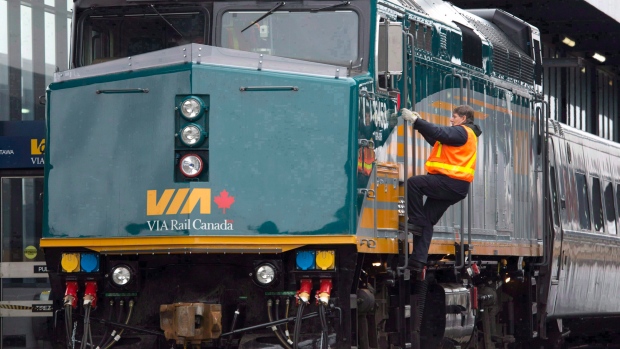Nov 27, 2018
Quebec angry as Ottawa signals Via Rail is free to pick Siemens over Bombardier
, Bloomberg News

OTTAWA - Quebec Premier Francois Legault said Tuesday “it makes no sense” for the federal government to let Via Rail award a major contract without ensuring any jobs are created in Canada.
Reacting to a report that the German firm Siemens AG has beaten out Bombardier Transportation for a $1-billion contract to build new Via Rail trains, Legault said Ottawa should have included a 25 per cent local content requirement - at a minimum.
“I can't get over seeing (Marc) Garneau throw in the towel,” Legault told reporters in Quebec City, referring to the federal transport minister.
Garneau told reporters earlier Tuesday that free trade agreements with Europe and the United States prevent the federal Crown corporation from favouring Bombardier in the awarding of contracts.
“We are competing around the world,” Garneau said. “At the federal level, we don't have the right to impose rules that favour Canadian companies when we believe in free trade deals.”
Garneau added that Via Rail is independent from the federal government.
La Presse reported Tuesday that Via Rail is negotiating the terms of the contract with Siemens after its submission beat out Bombardier Transportation and third-place Spanish company Talgo Inc. Bombardier was hoping the Via Rail contract would provide several years of work at its factory in La Pocatiere, Que.
Garneau did not confirm the report and said the contract tendering process is not finished. Via Rail also declined comment, saying the name of the winning bidder will be known in December.
Via Rail ruled out in March the possibility of requiring local content in its request for proposals. The company is seeking 32 new fuel-efficient, bi-directional trains to serve passengers in the Windsor-Quebec City Corridor.
Legault said the requirement for local content could be applied regardless of whether Siemens or Bombardier lands the contract
“It is the taxpayers who, through the federal government, are going to invest $1-billion in these trains,” Legault said. “And here we have a federal government that says. 'I'm not going to require any Canadian content.' It makes no sense.”
Claude Michaud, president of the union representing roughly 600 workers at Bombardier's factory in La Pocatiere, criticized Via's reported choice.
“It's inconceivable that (the contract) will be given to a German company,” he said.
Layoffs at the factory 150 kilometres northeast of Quebec City have already begun following the completion of a contract to produce cars for Montreal's subway system.
Bombardier Inc. this month announced it will cut 5,000 workers worldwide, half of them in Quebec. Almost all the Canadian jobs cut are in the company's aerospace division.
Michaud called on Via Rail to review its contract-awarding process. But the situation is not that simple, Garneau said.
Quebec can require local content when it makes acquisitions, he said, but that cannot be done at the federal level.
Garneau added that the recent trade deals between Canada and Europe, the U.S. and certain Pacific Rim countries gave Canadian businesses access to markets of more than 1.5 billion people.
Trade deals “create jobs and cost jobs,” Garneau said. “We can make arguments on both sides.”




